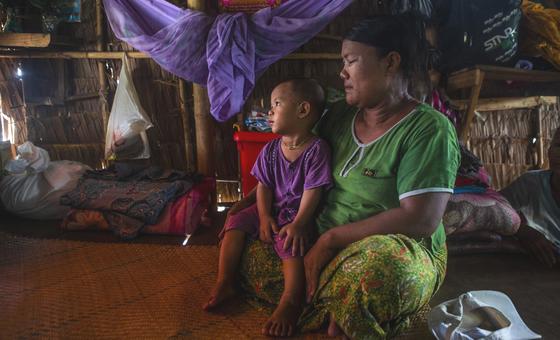Amid escalating hostilities in Myanmar sparked by a 2021 military coup that have plunged millions into a deepening humanitarian crisis, UN Secretary-General António Guterres on Friday urged the country’s neighbours “to leverage their influence” to bring about peace.
The UN chief’s appeal comes as aid agencies warn that millions of people remain in acute need across Myanmar – particularly in the north, southeast and Rakhine state. Their plight has been made even worse by torrential rainfall and catastrophic flooding, amid a lack of humanitarian access and insufficient relief funding.
“The humanitarian situation is spiralling. One-third of the population is in dire need of humanitarian assistance. Millions have been forced to flee their homes,” Mr. Guterres told a meeting of the Association of Southeast Asian Nations, ASEAN. “I support strengthened cooperation between the UN Special Envoy and the ASEAN Chair on innovative ways to promote a Myanmar-led process.”
Key to peace in Myanmar will be the effective implementation of ASEAN’s “Five-Point Consensus”, the Secretary-General said, referring to the bloc’s plan that includes an immediate end of violence, dialogue among all parties and increased humanitarian assistance.
Dire aid needs
According to the UN aid coordination office, OCHA, more than three million people are displaced across Myanmar, predominantly after fleeing “widespread” conflict which has generated “immense humanitarian needs”, particularly in the north, southeast, and Rakhine State”.
Since early September, one million people have also been affected by torrential monsoon rains and the aftermath of Typhoon Yagi. At least 360 people died in the floods and many more have been injured across multiple regions, according to reports.
There are also deep concerns about rising hunger levels after crops flooded and livestock were washed away, destroying the livelihoods of vulnerable communities.
Local volunteers are cleaning up areas where floodwaters have receded, but persistent rains and swollen rivers threaten further flooding, OCHA said.
To date, the aid response to date has provided food to more than 150,000 people in the southeast, northwest and Rakhine state; there are plans to reach an additional 73,000 people in the southeast. Over 80,000 people in the northwest have received water, sanitation and hygiene relief items, along with shelter materials and other non-food items.
Despite the challenges faced by aid workers in Myanmar, 40 per cent of the 5.3 million people targeted for support received some form of humanitarian assistance in the first half of the year.
OCHA underscored the key role played by national and local partners who have been working closely with communities and providing “a lifeline” of support. Much more could be done if funding could be found, the UN agency said, noting that 10 months into the year, the $1 billion response plan is critically underfunded at less than 30 per cent.

